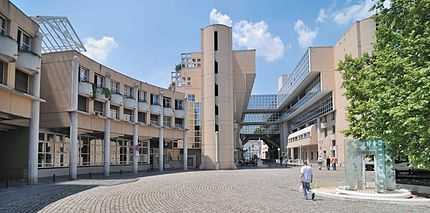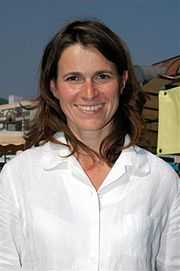École normale supérieure de Lyon
| École normale supérieure de Lyon | |
|---|---|
 | |
| Motto | L'enseignement par la recherche, pour la recherche |
Motto in English | Education through research, for research |
| Established | 1880 |
| Type | Grande école (École normale supérieure) |
| Endowment | €110 million |
Administrative staff | 350 researchers, 220 professors |
| Students | 2,000 |
| Postgraduates | 400 |
| Location | Lyon, France |
| Campus |
"Monod" (Science) "Descartes" (Humanities) |
| Website | www.ens-lyon.eu |
The École normale supérieure de Lyon (also known as ENS Lyon, ENSL or Normale Sup' Lyon) is a highly selective grande école located in Lyon, France. As one of France's four Écoles normales supérieures, ENS Lyon is associated with a strong French tradition of excellence and public service. It trains researchers and teachers in the sciences and the humanities. It is considered as one of the three most prestigious and best French universities along with its sister the École Normale Supérieure located in Paris and the École Polytechnique, and is ranked as the 100th[1] in the world.
History
- Early life of the ENS: Jules Ferry legacy
The Fontenay school, for girls, was founded by the decree of 13 July 1880.
The Saint-Cloud school, for boys, was founded by the decree of 22 December 1882. These two École Normale Supérieure were founded by Jules Ferry.
- Training teachers, inspectors and directors for primary education
1887: The decree of 18 January 1887 transformed the previous institutions into Écoles normales supérieures de l'enseignement primaire (of primary education), institutions which were free and modern, that is without compulsory Latin. The pupils were granted scholarships and were recruited using a competitive examination open to holders of the higher diploma or the baccalaureate who had signed a ten-year service commitment.
1897: The length of studies was increased from two to three years.
1945: The decree of 19 February 1945 granted both institutions the title of Écoles normales préparatoires à l'enseignement secondaire (institutions of preparation for secondary education). Pupils trained for the CAEC, then the CAPES teaching qualifications.
1956: The length of studies was increased to four years and the preparation of the agrégation teaching qualification appeared in the regulations.

- Towards the new École Normale Supérieure de Lyon
As part of France's process of decentralisation, the scientific departments moved to Lyon in 1987, with the creation of the École Normale Supérieure de Lyon.
Humanities students remained in what was called the ENS de Fontenay/St Cloud. In 2000, the humanities were transferred to the École Normale Supérieure Lettres et Sciences Humaines, also located in the Gerland district.
On 1 January 2010, the scientific branch and the arts, humanities and social sciences branch merged to become a single institution, retaining the name École Normale Supérieure de Lyon.[2]
Departments
Teaching at ENS Lyon is organised through eleven main departments.
Science departments
- Biology
- Chemistry
- Computer Science
- Earth Sciences
- Mathematics
- Physics
Humanities departments
- Art: History or Art, Cinema and Theater
- Foreign Languages: Linguistics, Civilizations and Literatures
- French: French and Francophone, Modern, Medieval and Classical Literature
- Human Sciences: Philosophy, History, Geography
- Social Sciences: Anthropology, Sociology
Research
23 of ENS Lyon's research groups have contractual ties to major research organizations, notably the CNRS and INSERM. ENS Lyon is a member of several advanced research networks and competitive clusters, including Lyon BioPôle, and hosts an Institute for Advanced Study, the Collegium de Lyon.
- Sciences
Institute of Functional Genomics of Lyon (IGFL) http://igfl.ens-lyon.fr/
Laboratory of molecular and cell biology (LBMC) http://www.ens-lyon.fr/LBMC/ENG
Laboratory of plant reproduction and development (RDP) http://www.ens-lyon.fr/RDP/?lang=en
Laboratory of human virology (VIRO) http://hvd.ens-lyon.fr
Laboratory of Earth Sciences (LST) http://www.ens-lyon.fr/LST/?lang=en
Joliot-Curie interdisciplinary laboratory (LJC) http://www.ens-lyon.fr/Joliot-Curie/?lang=en
Laboratory of Pure and Applied Mathematics (UMPA) http://www.umpa.ens-lyon.fr/
Laboratory of chemistry http://www.ens-lyon.fr/CHIMIE
Computer science laboratory (LIP) http://www.ens-lyon.fr/LIP
Laboratory of physics http://www.ens-lyon.fr/PHYSIQUE
Astronomy research center (CRAL) http://www-obs.univ-lyon1.fr/?lang=en
Center for high field Nuclear Magnetic Resonance (CRMN) http://www.ens-lyon.fr/crmn
- Arts and Humanities
C2SO - Communication, culture and society
Institute for the History of Classical Thought, from Humanism to the Enlightenment
Institute of East Asian Studies (IAO) http://iao.ish-lyon.cnrs.fr
Interactions, Corpuses, Learning and Representations http://icar.univ-lyon2.fr
Interdisciplinary approach to the logics of power in medieval Iberian societies
Literature, Ideologies and Représentations in the Eighteenth and Nineteenth Centuries
Rhône-Alpes Centre for Historical Research
Socialisation Research Group
Triangle: Action, Discourses, Economic and Political Thought
History and Archaeology of the Medieval Christian and Islamic Worlds
Economic Theory and Analysis Group
Admission
"Normaliens"
ENS Lyon retains its close links to the classes préparatoires which prepare high-level students previously selected on the basis of their previous academic record for the competitive entrance examination that is taken after two years of pluridisciplinary undergraduate-level study.
Students who succeed in the entrance examinations, which attract some 6000 candidates for 228 positions, are known as Normaliens; those who are from France or another European Union country are considered trainee public servants, and receive a salary for their studies during 4 years. A second entrance examination is also open to students who have not gone through the "classes préparatoires" system.
After these 4 years, Normaliens can also receive an additional 3 year-fellowship to get a PhD.
"Auditeurs"
Entry to ENS Lyon is not restricted to “normaliens”. Students may also apply through a separate admissions process to study for an ENS Masters or PhD degree, or for the final year of an undergraduate degree offered in conjunction with one of Lyon's universities.
- Alumni of the Écoles normales supérieures of Lyon, Saint-Cloud and Fontenay-aux Roses on Wikipedia
Studies

Classical studies for a Normalien
- First year at the ENS
Students prepare the third year of Licence, the equivalent of a UK Bachelor's degree. The ENS de Lyon offers 5 final year courses for Sciences (Biology, Chemistry and Physics, Earth Sciences, Computer Sciences, Mathematics). These courses are conceived as preparations for Masters.
- Second and third year at the ENS
Students prepare in two years their Master degree. 5 research Masters are proposed in Sciences, 36 in Humanities (Languages, Literature, Human and Social Sciences).
- Fourth year at the ENS
During this year, students can prepare the agrégation teacher recruitment examination in 16 different subjects. Students can also start their PhD, go studying for one year or more in a foreign country, or follow during one year courses in other subjects (students from biology can therefore follow courses in Humanities).
Between the first and fourth year, Normaliens can also spend up to 2 free years called "année sans solde", during which they can study other disciplines, go studying in a foreign country, or do a long internship. Each année sans solde project needs the authorization of the ENS supervisors.
Other Studies
- Auditeurs (i.e. non paid-students) can join the ENS as second or third year student (Master students), but also for the first year in sciences, and independently for the agregation. Except they are not paid, they follow the same courses as the Normaliens.
- Doctorates: The ENS de Lyon welcomes around 400 PhD students. Both Normaliens and Auditeurs (from the ENS or from other universities) can be PhD students within the different laboratories of the ENS. It requires three years of research work and specific training in the form of tuition or the participation in seminars.
Rankings
The 2011 QS World University Rankings[4] ranked ENS Lyon 133rd in the world.
The 2010 Times Higher Education World University Rankings[1] ranked ENS Lyon 100th in the world.
Generally international rankings do not suit well the ENS system, as these structures are very small and centered more on the education of students rather than on internal research. For instance, many French universities have better international rankings than the ENS have, even though the ENS are considered by French to be among the highest academic institutions.
Notes and references
- ↑ 1.0 1.1 "THE World University Rankings 2010: The Top 200".
- ↑ Décret n° 2009-1533 du 10 décembre 2009 portant création de l'Ecole normale supérieure de Lyon
- ↑ Source : Official biography on the government website.
- ↑ QS World University Rankings - 2011. Top Universities (2012-12-19). Retrieved on 2014-06-16.
External links
Coordinates: 45°43′47″N 4°49′37″E / 45.729734°N 4.826875°E
| ||||||||||||||||||||||||||
| ||||||
| ||||||||||||||||||||||||||||||||||||